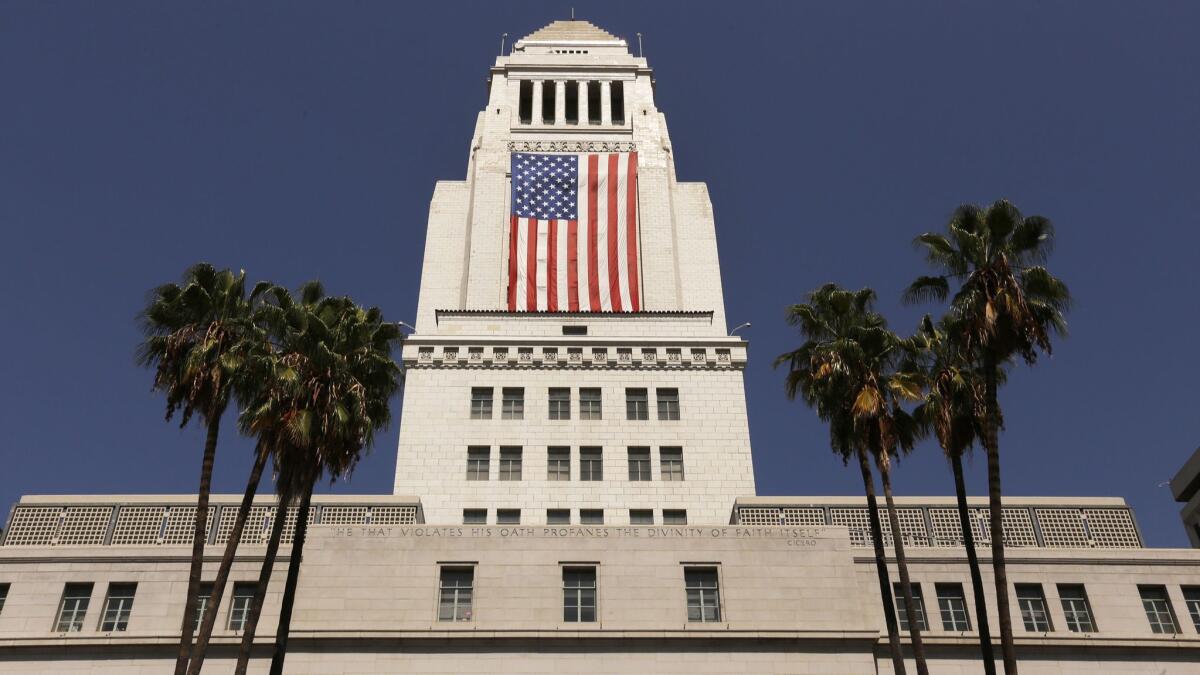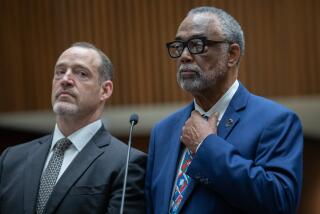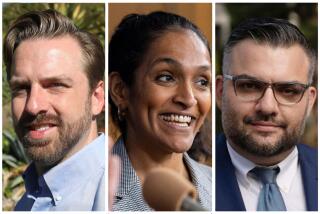For L.A. candidates seeking public money, it won’t be enough to just agree to debate, officials say

For decades, Los Angeles city candidates who wanted to tap into public money for their campaigns have had to agree to debate their opponents.
But actually participating in a debate has never been required, according to the Ethics Commission.
Ethics Commission staffers said they feared that a candidate could lose out on the matching funds because a rival refused to debate them. That public money is provided by the city to qualifying candidates to help offset the influence of wealthy donors.
Now, under a revised rule backed by the City Council on Friday, city officials say candidates who get matching funds would have to take part in either a debate or a town hall meeting where they face questions from the public.
Ethics Commission staffers said that would require candidates to engage with voters and share their views, while giving them another way to follow the rules if they couldn’t get their opponents to debate.
The California Clean Money Campaign, the League of Women Voters of Los Angeles and Unrig L.A., among other groups, had urged the city to require candidates getting the money to actually participate in an event where voters could learn what they stand for, whether it was a debate or a town hall, so that “candidates don’t skirt this important civic responsibility.”
But Studio City Neighborhood Council member Eric Preven, who ran against Councilman Paul Krekorian three years ago, argued that allowing a town hall rather than a debate would leave “too much wiggle room for incumbents to avoid getting on a stage with their challengers.”
Preven complained that Krekorian received $44,000 in matching funds when he ran, yet never debated him. He said he had reached out to a Krekorian aide who was assisting with the campaign to try to arrange a debate, but nothing came of it. He later emailed Krekorian himself the day before the election, inviting him to join him at a campaign event that afternoon.
Krekorian spokesman Ian Thompson said that “it isn’t custom in any election for one candidate to directly set up a debate with the other.” Instead, outside groups usually set up debates, Thompson said, but none of them ultimately did.
Under the old rules, candidates met the debate requirement as long as they signed a form pledging to participate in debates, regardless of whether one occurred, according to Nancy Jackson, director of strategic communications for the Ethics Commission.
The new ordinance says candidates must now provide the date they participated in a debate or a town hall meeting, along with a copy of the invitation or event announcement, in order to claim the money. David Tristan, the commission’s deputy executive director, said candidates would get the money only after participating in such an event.
Carolina Goodman, a member of the League of Women Voters of Los Angeles, said she was worried that the new law still might not have any teeth. Goodman also challenged whether the city definition of a “town hall” was strict enough to ensure that such an event didn’t “devolve into a campaign rally.”
The City Council also voted Friday to draft new rules that would sharply accelerate the rate at which candidates can receive taxpayer money to match their campaign donations. The new rules would make the system simpler and more generous. They also moved to halve the number of donations from district residents that candidates need to get before qualifying for matching funds.
Council members touted those changes as a way to help level the playing field for grass-roots candidates.
Under the existing system for getting matching funds, “it turns out that most of the people that benefited were City Council members who already have an advantage in raising funds and other well-funded candidates,” Councilman Paul Koretz said, calling the proposed changes a “no-brainer.”
However, council candidates would still not qualify for matching funds until they had raised a minimum of $25,000 that meets a complicated set of requirements. Several groups warned Friday that reaching that threshold would become even harder because the city is poised to slash the amount of each donation that counts toward the target, reducing it from $250 to roughly $115 for council candidates.
In reaction, Councilman Mike Bonin suggested lowering the minimum to roughly $11,500 in council races — a target that could be reached with 100 donations from city residents.
The California Clean Money Campaign and other groups said they hoped that change, which was referred to a committee for more discussion, would be included when the new regulations come back to the council for a final vote.
“If this is a city for the many, not just the money, I hope you will vote for it and show that,” said Rob Quan, an organizer with the Unrig L.A. coalition.
Twitter: @AlpertReyes
More to Read
Start your day right
Sign up for Essential California for news, features and recommendations from the L.A. Times and beyond in your inbox six days a week.
You may occasionally receive promotional content from the Los Angeles Times.







